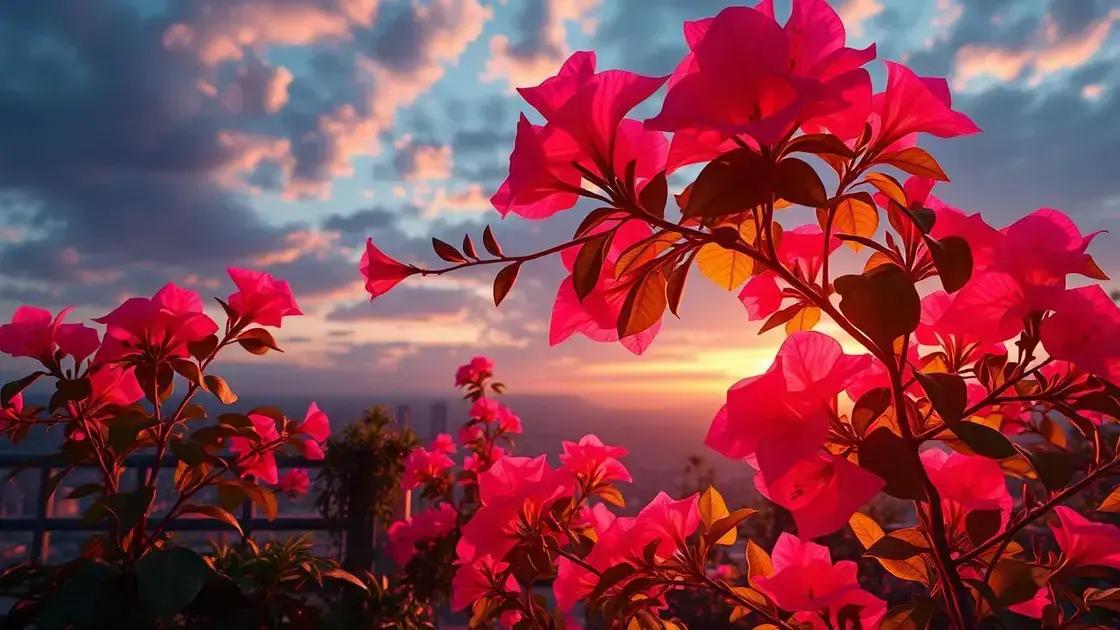How to Care for a Bougainvillea Plant: 5 Essential Tips for Thriving Blooms
How to care for a bougainvillea plant may seem daunting at first, but with the right techniques, you can turn your garden into a colorful paradise. These stunning plants bring joy with their vibrant flowers, but knowing how to nurture them is key. Let’s explore some fundamental care strategies that can help you achieve lush growth and beautiful blooms.
Table of Contents
ToggleEssential watering tips for bougainvillea success
Essential watering tips for bougainvillea success are vital to ensure your plants flourish. Understanding the watering needs of your bougainvillea will make a significant difference in their health and vibrancy.
Bougainvilleas thrive in dry conditions, often requiring less water than other plants. Here’s how to master the watering routine for your bougainvillea:
- Water deeply but infrequently: This encourages the roots to grow deep into the soil.
- Check soil moisture: Before watering, ensure the top 2-3 inches of soil are dry.
- Time your watering: Early morning is the best time to water, minimizing evaporation.
Additionally, if you live in a humid climate, you may need to adjust your watering frequency. Here’s a brief overview:
| Climate Type | Watering Frequency |
|---|---|
| Dry | Once every 1-2 weeks |
| Humid | Once every 2-3 weeks |
It’s crucial to ensure proper drainage, as bougainvilleas are sensitive to waterlogged soil. Pots should have holes at the bottom, and you can also add a drainage layer of gravel. Exploring indoor gardening techniques can offer further insights into managing bougainvillea care indoors.
Monitoring leaves can also inform your watering strategy: yellowing leaves may indicate overwatering, while wilting can suggest that your plant is thirsty. Stay attentive to your bougainvillea’s signals!
Best soil types for thriving bougainvillea plants

Best soil types for thriving bougainvillea plants are essential to ensuring your bougainvillea flourishes and produces brilliant blooms. The right soil composition provides the necessary drainage and nutrients that your plants need.
Here are key soil characteristics to look for when planting bougainvillea:
- Well-draining: Bougainvilleas prefer soil that drains quickly to prevent root rot.
- Lightweight: A lighter potting mix allows for good aeration while keeping moisture levels optimal.
- Nutrient-rich: Incorporate organic matter to provide essential nutrients for healthy growth.
Below are the best soil types to consider for your bougainvillea:
- Cactus mix: This soil type is perfect due to its excellent drainage properties, ideal for bougainvillea.
- Potting mix amended with sand: Adding sand to a standard potting mix enhances drainage, ensuring roots remain healthy.
- DIY mix: Create your own blend by combining equal parts of compost, sand, and perlite for a nutrient-rich solution.
If you’re keeping bougainvillea indoors, using a pot with drainage holes is crucial. Exploring indoor gardening techniques can help you choose the right soil setup for your plant.
Monitoring your plant’s growth will also guide you in maintaining optimal soil conditions. If you notice slowing growth, consider repotting with a fresh soil mix that meets the bougainvillea’s requirements.
Sunlight requirements for vibrant bougainvillea blooms
Sunlight requirements for vibrant bougainvillea blooms are crucial to ensuring your plants produce the stunning, colorful flowers they are known for. Bougainvilleas love the sun, and providing the right light exposure can lead to a breathtaking display.
Here are key points to consider regarding their sunlight needs:
- Full sun: Bougainvilleas thrive best when exposed to at least 5 to 6 hours of direct sunlight each day.
- Sunlight location: Choose a location that is free from shading by trees or buildings to maximize light intake.
- Indoor care: For indoor bougainvilleas, place them near south or west-facing windows to provide ample sunlight.
When it comes to sunlight, timing can also make a difference. Here are some considerations:
- Morning sun: Morning sunlight is beneficial, as it warms the plants and dries any moisture, reducing the risk of fungal diseases.
- Avoid excessive afternoon sun: In extremely hot climates, some afternoon shade can help protect the plants from scorching.
If you’re interested in learning more about care for indoor plants, exploring indoor gardening techniques will provide further insights into managing bougainvilleas effectively.
It’s important to monitor your bougainvillea for signs of inadequate sunlight, such as leggy growth or sparse blooms. Adjusting the plant’s location or providing supplemental lighting can help enhance its health.
In conclusion
Caring for bougainvillea plants requires attention to various factors, including proper watering techniques, ideal soil types, and sufficient sunlight exposure. By following these essential tips, you can enjoy thriving bougainvillea blooms that add vibrant colors to your garden or indoor space. Remember, healthy plants are a reflection of good care and knowledge. Don’t hesitate to explore additional resources, like tips on enhancing your indoor garden, to further enrich your gardening experience.

